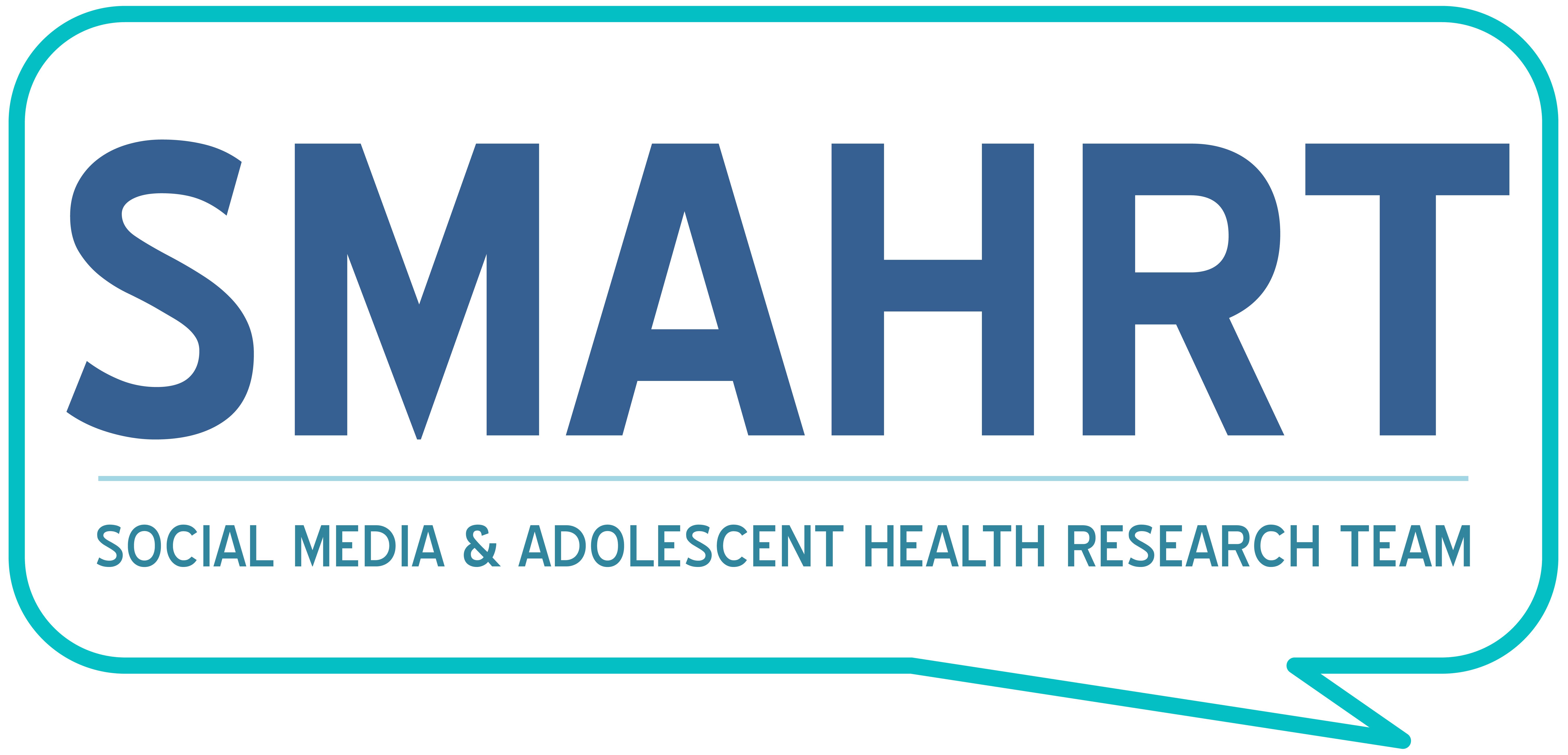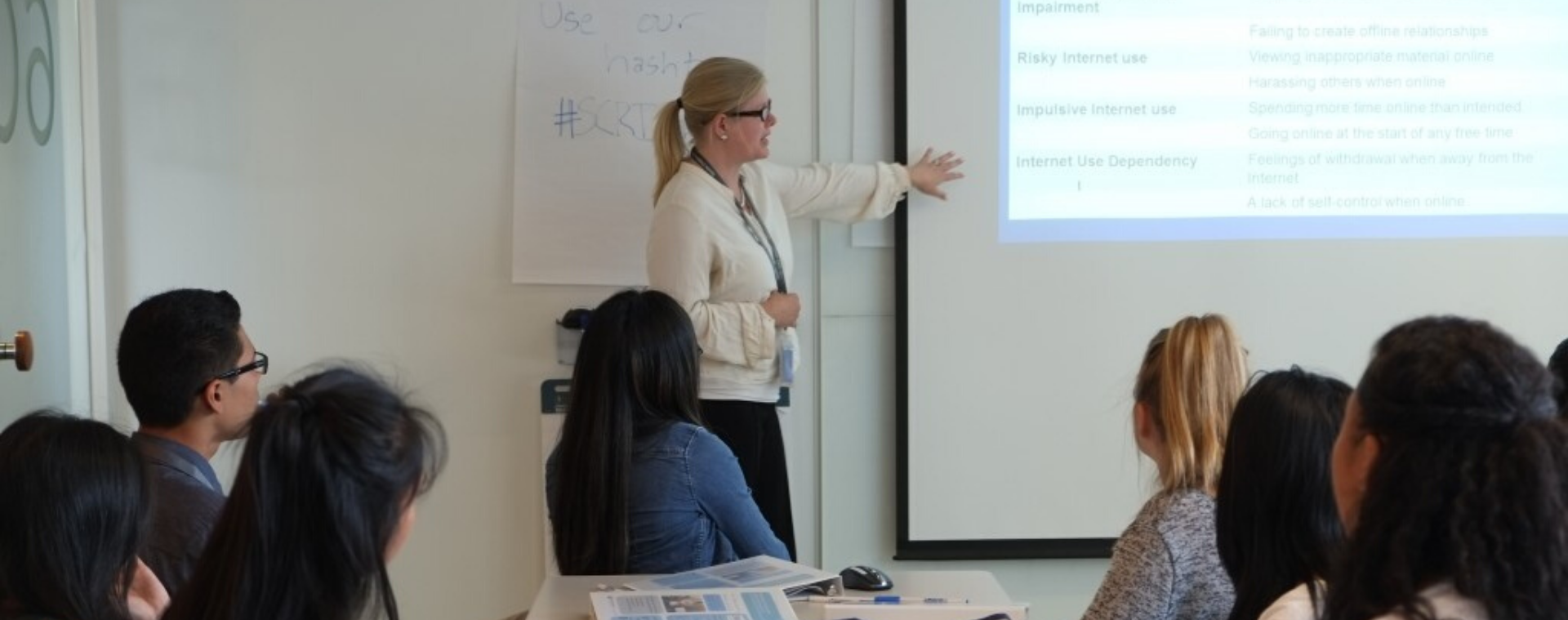The purpose of these interconnected projects is to investigate key issues in online safety, and to provide adolescents and their families with sound and relevant education on safe internet use in a meaningful and appealing manner. Towards this goal we apply a transdisciplinary approach, which combines elements of public health, education, and consumer science.
Internet safety: Education and prevention approaches
Internet Safety Education for Youth: Key Perspectives
This study evaluated views from public school teachers, clinicians, parents and adolescents regarding internet safety education. A total of 356 participants completed the survey including 77 teachers, 111 clinicians, 72 parents, and 96 adolescents. The overall mean age suggested by survey respondents at which to begin teaching internet safety was 7.2 years (SD = 2.5). Internet safety was regularly taught by some teachers (20.8%), few clinicians (2.6%), and many parents (40.3%). The majority of teachers, clinicians, and parents were willing to teach internet safety, but all groups surveyed identified parents as having primary responsibility for teaching this topic. Findings suggested agreement among key stakeholders for teaching internet safety at a young age, and for identifying parents as primary teachers of this topic.
| Moreno, M. A., Egan, K. G., Bare, K., Young, H. N., & Cox, E. D. (2013). Internet safety education for youth: stakeholder perspectives. BMC public health, 13(1), 1-6. |
Avenues and Barriers of Internet Safety Education: A Focus Group Study
The purpose of this study is to learn views of adult professionals in greater Wisconsin regarding internet safety education for children through a focus group study. Our specific objective is to gain qualitative feedback about the avenues and barriers of internet safety education. We will use this information to develop a collaborative online safety education initiative.
Internet Safety Education in the Clinic Setting: A Pilot Intervention
The purpose of this study was to develop an education booklet about online safety for use by parents and children. The booklet was developed through a review of scientific literature, an examination of currently available education materials, and the application of basic marketing principles and distributed to thirty 7-12 year-old patients and their parents. Parents were surveyed about their internet safety practices and their receptivity to the booklet. In a baseline survey, 25 (83%) parents reported previous discussions with their child about internet safety, and 47% reported that conversations occurred monthly or more. Privacy protection, predators, and surfing safety were the most commonly discussed topics. A majority of parents reported consulting the internet (50%) for this safety information.
In a follow-up survey, 85% of parents reported at least one internet safety conversation after receiving the booklet. Of parents who had reported no previous internet safety discussions at baseline, 75% reported at least one conversation after receiving the booklet. The booklet was also viewed by other children in 40% of households.
A Review of the Quality and Appeal of Internet Safety Educational Material Available Online
Currently available educational websites regarding internet safety were systematically reviewed in order to determine the overall qualtiy and appeal of these websites. The results of this review will provide insight on the ways websites can be developed and designed in order to help improve the internet safety information that parents encounter and use to educate their children.
Affiliate project: Adolescent Health in Primary care Practices (AHiPP)
Partnering with colleagues from the American Academy of Pediatrics in their Pediatric Research in Office Settings (PROS) group, this project is led by Dr. Jon Klein and has a primary goal centered on reduction of tobacco use among teens. The active control arm of this intervention study is a social media safety intervention which includes a brief counseling session by a pediatrician. Applying our previous work, we contributed to the design of this intervention and supporting materials. We continue as co-investigators project.
Specific internet safety concerns: Cyberbullying
Cyberbullying and college students: An exploratory study
In this study we conducted focus groups with college students and identified their views on these behaviors, as well as specific behaviors they consider as cyberbullying. The findings for this study will contribute to a scale to assess cyberbullying among college students.
| Presented at a conference: Kota Rajitha, Moreno Megan A. Cyberbullying among college students. Excellence in Pediatrics conference. Madrid, Spain. December 2012 |
Cyberbullying prevalence and association with depression
This project assessed different types of cyberbullying behaviors and their association with depression.
Electronic harassment: Definition and measurement tool
We received a grant from the National Institute for Justice to develop a stakeholder-based definition of cyberbullying and related measurement tool.
Cyberbullying and college students: Prevalence and associations
In this study we conducted a four-site survey of college students to determine the prevalence of particular cyberbullying behaviors.
Bullying and news media study
The purpose of this study is to evaluate the current state of news organization coverage of bullying and cyberbullying and its impact on youth and families.
Aim 1: To determine youth and parent perspectives on news media coverage of bullying
Aim 2: To conduct a content analysis of journalism coverage of bullying
Aim 3: To understand journalists’ perspectives regarding strategies, priorities and challenges in coverage of bullying news stories toward developing future intervention approaches.
| Aubrey Gower, Tracy Vaillancourt, Heather Brittain, Karen Pletta, Megan A. Moreno. Understanding news media coverage on bullying and cyberbullying. Poster presentation. March 2019. Washington, D.C. |
| Karen Pletta, Aubrey Gower, Megan A. Moreno. Adolescent and parent recommendations for news media to reduce bullying. Poster presentation. March 2019. Washington, D.C. |
| Aubrey Gower, Karen Pletta, Reese Hyzer, Catherine Kelley, Megan A. Moreno. Teens perspectives on news media and youth bullying: A qualitative study. Platform presentation. April 2019. Baltimore, Maryland. |
| Reese Hyzer, Aubrey Gower, Megan A. Moreno. Teen and parent concordance on bullying and cyberbullying roles. Bullying behavior among adolescents: A complex problem requiring a multifaceted solution. Collaborative program. August 2019. Chicago, Illinois. |
| Reese Hyzer, Aubrey Gower, Karen Pletta, Catherine Kelley, Tracy Valliancourt, Megan Moreno. Adolescents’ and parents’ perceptions of news media and youth bullying: A qualitative study. Poster presentation. November 2019. Chicago, Illinois. |
| Moreno, M. A., Gower, A. D., Brittain, H., & Vaillancourt, T. (2019). Applying natural language processing to evaluate news media coverage of bullying and cyberbullying. Prevention science, 20(8), 1274-1283. |
Translation of research into practice
Parent handbook
In an effort to provide translation of our research findings to parents and other adult caregivers on topics related to internet safety, we have written a book.
| Moreno, M. A. (2013). Sex, Drugs’n Facebook: A Parents’ Toolkit for Promoting Healthy Internet Use. Hunter House Publishers. |

